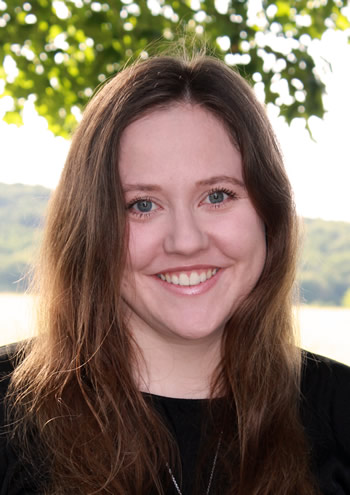Ina Huppertz, PhDWritten by Isha Verma, PhD  Dr. Ina Huppertz is a research group leader at the Max Planck Institute for Biology of Ageing (MPI AGE) in Cologne, Germany. Her lab aims to systematically identify and study how RNA-binding proteins participate in metabolic regulation and are themselves altered upon metabolic rewiring. For this, her team uses metabolically diverse systems including differentiating mouse embryonic stem cells plus quiescent versus activated adult stem cells. Dr. Huppertz is fascinated by visualizing metabolism using genetically encoded metabolite sensors in combination with RNA interactome capture and CRISPR/cas9 screens targeting RNA-binding proteins. For her doctoral studies, Dr. Huppertz wanted to join a research group that worked on a fundamental biological process applicable to all cell types and study it in the context of neurodegeneration. When she started her graduate studies at the University of Cambridge in the United Kingdom in 2012, on a transcriptome level, little was known about where RNA-binding proteins bound to RNAs and even less was known about their associated regulatory mechanisms. Therefore, she decided to join one of the leading experts in the field, Professor Jernej Ule, who taught her the crosslinking and immunoprecipitation (CLIP) technique and how she could apply it to answer these big questions. She focused on the notoriously difficult-to-study protein, with its condensation-prone C-terminal domain, TDP-43. In an exciting advance for all RNA biologists, recent enhancements of CLIP (eCLIP) technologies, spearheaded by Professor Gene Yeo's group and supported by the ENCODE consortium, have made these difficult-to-generate data publicly available. After her Ph.D., Dr. Huppertz moved to the European Molecular Biology Laboratory (EMBL) in Heidelberg for her postdoctoral training in Professor Matthias Hentze’s research group. Her postdoctoral research required the painstaking optimization of virtually all techniques used to study the RNA-binding capacity of the glycolytic enzyme Enolase 1. Dr. Hentze provided her with the support and time she needed to follow up on the intricate details of the inhibitory potential of RNAs on glycolysis, a process called riboregulation. Dr. Hentze's skillful mentorship helped her set achievable goals and keep her research on course without getting sidetracked and lost in the details. One of the most valuable lessons she learned during her training was the importance of carefully designing experiments and being patient while working on a research project.
Dr. Huppertz is inspired by scientists who succeed despite adversity and those that dared to challenge the norm by working on projects that others do not deem worthy. She aspires to be as brave as scientists who followed their instincts and opened up new research avenues. She states that she has seen this quality in both her previous mentors- Dr. Ule and Dr. Hentze. Dr. Huppertz started her research group at the Max Planck Institute for Biology of Ageing in August 2022. “The MPI AGE has phenomenal core facilities, including metabolomics, proteomics, flow cytometry, and imaging. The research groups here work on remarkably diverse topics to address the enigmatic ageing process, and with my work on RNA-binding proteins involved in regulating metabolism and ageing I hope to fill an exciting niche. I wanted to benefit from the strong expertise in metabolism research, specifically on mitochondrial biology, in Cologne and expand my horizon by studying RNA-binding proteins in ageing,' Huppertz states. To the young students starting their research career, Huppertz's advice is- “Be patient with yourself! You cannot be an expert in your field at the start of your graduate studies. Still, you can improve daily by reading the literature inside and outside your field, seeking out scientific discussions, and engaging in outreach activities. Over the long term, identifying your knowledge gap and challenging your hypotheses will help you become a well-rounded scientist.” In addition to her research, Dr. Huppertz is passionate about sharing science with the broader community, so she tries to engage in as many outreach activities as her schedule permits. She has participated in events such as 'Pint of Science' and 'Science Movie Nights'. She feels strongly obligated to share her scientific excitement with the public and communicate the importance of basic science research. 'While breaking down certain processes into digestible bites can be difficult, the feedback and curiosity these events trigger is extremely rewarding,' Huppertz states. She recently organized a small Cologne/Bonn RNA community meeting bringing together junior and senior RNA biologists in immunology, genome stability, stem cell biology, and metabolism. Dr. Huppertz loves to attend the RNA Society’s annual meetings as they provide the best opportunities to meet old friends and make new ones. “In 2016, at the RNA Society meeting in Kyoto, I had the best time meeting researchers from Gene Yeo's lab, who (over a couple of beers) convinced me to try eCLIP. I became a convert” she states. In addition to attending scientific conferences, Huppertz likes to keep updated on the current research in the RNA field by reading the RNA journal. The RNA journal's recent special issue, 'RNA in Biological Condensates' is one of her favorites. She isparticularly fascinated by the recent work of Ivan Ahel's, Karla Feijs’s and Roko Žaja's groups on ADP ribosylation of RNAs and their enigmatic roles in mammalian cells. Dr. Huppertz is highly active on Twitter (@ina_huppertz), where she shares her favorite papers in the RNA field and hopes to highlight her group's exciting projects soon. “I would be more than happy for people to contact me if they are interested in collaborations or fascinated by our research approaches.” |
